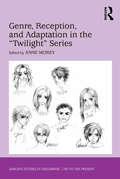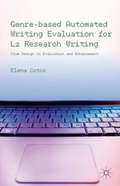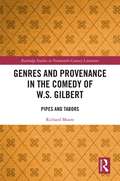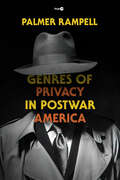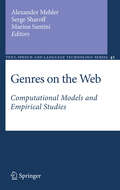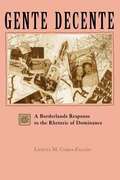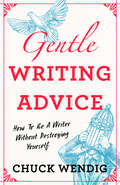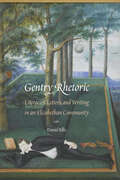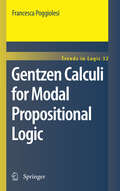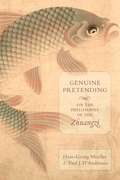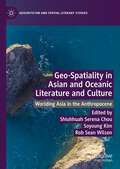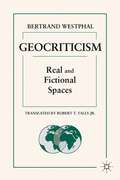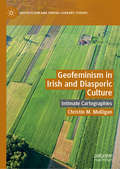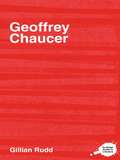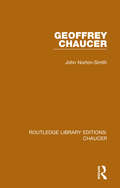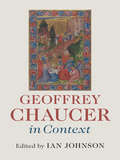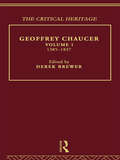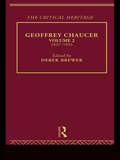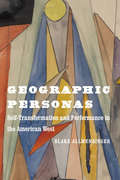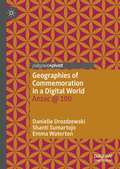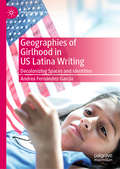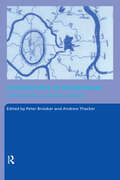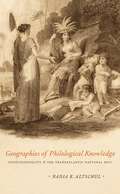- Table View
- List View
Genre, Reception, and Adaptation in the 'Twilight' Series (Studies in Childhood, 1700 to the Present)
by Anne MoreyMuch of the criticism on Stephenie Meyer's immensely popular 'Twilight' novels has underrated or even disparaged the books while belittling the questionable taste of an audience that many believe is being inculcated with anti-feminist values. Avoiding a repetition of such reductive critiques of the series's purported shortcomings with respect to literary merit and political correctness, this volume adopts a cultural studies framework to explore the range of scholarly concerns awakened by the 'Twilight novels and their filmic adaptations. Contributors examine 'Twilight's debts to its predecessors in young adult, vampire, and romance literature; the problems of cinematic adaptation; issues in fan and critical reception in the United States and Korea; and the relationship between the series and contemporary conceptualizations of feminism, particularly girl culture. Placing the series within a broad tradition of literary history, reception studies, and filmic adaptation, the collection offers scholars the opportunity to engage with the books' importance for studies of popular culture, gender, and young adult literature.
Genre-Based Automated Writing Evaluation for L2 Research Writing
by Elena CotosResearch writing and teaching is a great challenge for novice scholars, especially L2 writers. This book presents a compelling and much-needed automated writing evaluation (AWE) reinforcement to L2 research writing pedagogy.
Genres and Provenance in the Comedy of W.S. Gilbert: Pipes and Tabors (Routledge Studies in Nineteenth Century Literature #2)
by Richard MooreIn The Progress of Fun W.S. Gilbert was considered, not as a ‘classic Victorian’, but as part of an on-going comedic continuum stretching from Aristophanes to Joe Orton and beyond. Pipes and Tabors continues the story, covering the comedic experience differently by reference to genres. Here – treated in relation to a line of significant others – we discover how Gilbert responded to areas such as the Pastoral, the Irish drama, nautical scenarios, melodrama, sensation-theatre, the nonsensemode, pantomime spectaculars, fairy plays, and classical farce. Also included is a wider look at his relation to various European musical forms and (for instance) to the English line of wit and the Elizabethan pamphleteers. To consider a writer not so much by a study of individual works as by threads of linking generic modes tells us a great deal about cultural interconnections and the richly textured nature of theatrical experience. Pipes and Tabors offers a tapestry of overlapping genres and treatments, showing not just the design of the finished products but the shreds and patches which form the underside of the weave. According to Dorothy L. Sayers, life itself offers us the apparent loose ends of a design which will only be revealed from the front after death. In terms of Gilbertian comedy, we are privileged to be able to track both the effort of the weave and the skill of the finished product. On the way we will also discover some new links and sub-text implications about other 19th century denigrated groups which were buried from sight for too long.
Genres of Privacy in Postwar America (Post*45)
by Palmer RampellWith this incisive work, Palmer Rampell reveals the surprising role genre fiction played in redefining the category of the private person in the postwar period. Especially after the Supreme Court established a constitutional right to privacy in 1965, legal scholars, judges, and the public scrambled to understand the scope of that right. Before and after the Court's ruling, authors of genre fiction and film reformulated their aliens, androids, and monsters to engage in debates about personal privacy as it pertained to issues like abortion, police surveillance, and euthanasia. Triangulating novels and films with original archival discoveries and historical and legal research, Rampell provides new readings of Patricia Highsmith, Dorothy B. Hughes, Philip K. Dick, Octavia Butler, Chester Himes, Stephen King, Cormac McCarthy, and others. The book pairs the right of privacy for heterosexual sex with queer and proto-feminist crime fiction; racialized police surveillance at midcentury with Black crime fiction; Roe v. Wade (1973) with 1960s and 1970s science fiction; the Child Abuse Prevention and Treatment Act (1974) with horror; and the right to die with westerns. While we are accustomed to defenses of fiction for its capacity to represent fully rendered private life, Rampell suggests that we might value a certain strand of genre fiction for its capacity to theorize the meaning of the protean concept of privacy.
Genres on the Web
by Alexander Mehler Serge Sharoff Marina SantiniThe volume "Genres on the Web" has been designed for a wide audience, from the expert to the novice. It is a required book for scholars, researchers and students who want to become acquainted with the latest theoretical, empirical and computational advances in the expanding field of web genre research. The study of web genre is an overarching and interdisciplinary novel area of research that spans from corpus linguistics, computational linguistics, NLP, and text-technology, to web mining, webometrics, social network analysis and information studies. This book gives readers a thorough grounding in the latest research on web genres and emerging document types. The book covers a wide range of web-genre focused subjects, such as: * The identification of the sources of web genres * Automatic web genre identification * The presentation of structure-oriented models * Empirical case studies One of the driving forces behind genre research is the idea of a genre-sensitive information system, which incorporates genre cues complementing the current keyword-based search and retrieval applications.
Gente Decente
by Leticia Magda Garza-FalcónIn his books The Great Plains, The Great Frontier, and The Texas Rangers, historian Walter Prescott Webb created an enduring image of fearless, white, Anglo male settlers and lawmen bringing civilization to an American Southwest plagued with "savage" Indians and Mexicans. So popular was Webb's vision that it influenced generations of historians and artists in all media and effectively silenced the counter-narratives that Mexican American writers and historians were concurrently producing to claim their standing as "gente decente," people of worth.These counter-narratives form the subject of Leticia M. Garza-Falcón's study. She explores how prominent writers of Mexican descent-such as Jovita González, Américo Paredes, María Cristina Mena, Fermina Guerra, Beatriz de la Garza, and Helena María Viramontes -have used literature to respond to the dominative history of the United States, which offered retrospective justification for expansionist policies in the Southwest and South Texas. Garza-Falcón shows how these counter-narratives capture a body of knowledge and experience excluded from "official" histories, whose "facts" often emerged more from literary techniques than from objective analysis of historical data.
Gentle Flame: The Life and Verse of Dudley, Fourth Lord North
by Dale B. RandallGentle Flame recounts the life and presents for the first time the hitherto unknown poetry of Dudley, Fourth Lord North. Born during the reign of Elizabeth I, reared in that of James I, elected to Parliament under Charles I, and retired to his country seat during the time of Charles II, the life an poetry of the Fourth Lord North deepens present-day understanding of an age that saw much social change.
Gentle Writing Advice: How to Be a Writer Without Destroying Yourself
by Chuck WendigFinally--a book of writing advice that accounts for all of the messy, perverse, practical, and inexplicable parts of being a human who writesThe truth is that all of the "writing rules" you've learned are bullshit. Sure, they work for some people, but the likelihood that they'll work for you--unique butterfly of a person that you are--is slim. That doesn't mean you're out of luck! There is meaningful advice to be had in the writing world, and Chuck Wendig is here to deliver it. In this hilarious guide, Wendig will help you discover more about yourself as a writer, parse through your quirks and foibles, and help you figure out the best way for you to get words on the page--without destroying yourself along the way. With behind-the-scenes stories of Wendig's own writing struggles, sections on debunking popular advice, self-care tips, and more footnotes than are strictly necessary (or legally recommended by scientists), Gentle Writing Advice will give the unvarnished truth about the writing process and remind you of what's actually important--taking care of the writer. (That's you, by the way.)
Gentry Rhetoric: Literacies, Letters, and Writing in an Elizabethan Community (Early Modern Cultural Studies)
by Daniel EllisGentry Rhetoric examines the full range of influences on the Elizabethan and Jacobean genteel classes&’ practice of English rhetoric in daily life. Daniel Ellis surveys how the gentry of late sixteenth- and early seventeenth-century Norfolk wrote to and negotiated with each other by employing Renaissance humanist rhetoric, both to solidify their identity and authority in resisting absolutism and authoritarianism, and to transform the political and social state. The rhetorical training that formed the basis of their formal education was one obvious influence. Yet to focus on this training exclusively allows only a limited understanding of the way this class developed the strategies that enabled them to negotiate, argue, and conciliate with one another to such an extent that they could both form themselves as a coherent entity and become the primary shapers of written English&’s style, arrangement, and invention.Gentry Rhetoric deeply and inductively examines archival materials in which members of the gentry discuss, debate, and negotiate matters relating to their class interests and political aspirations. Humanist rhetoric provided the bedrock of address, argumentation, and negotiation that allowed the gentry to instigate a political and educational revolution in seventeenth- and eighteenth-century England.
Gentzen Calculi for Modal Propositional Logic
by Francesca PoggiolesiThe book is about Gentzen calculi for (the main systems of) modal logic. It is divided into three parts. In the first part we introduce and discuss the main philosophical ideas related to proof theory, and we try to identify criteria for distinguishing good sequent calculi. In the second part we present the several attempts made from the 50's until today to provide modal logic with Gentzen calculi. In the third and and final part we analyse new calculi for modal logics, called tree-hypersequent calculi, which were recently introduced by the author. We show in a precise and clear way the main results that can be proved with and about them.
Genuine Pretending: On the Philosophy of the Zhuangzi
by Hans-Georg Moeller Paul J. D'AmbrosioGenuine Pretending is an innovative and comprehensive new reading of the Zhuangzi that highlights the critical and therapeutic functions of satire and humor. Hans-Georg Moeller and Paul J. D’Ambrosio show how this Daoist classic, contrary to contemporary philosophical readings, distances itself from the pursuit of authenticity and subverts the dominant Confucianism of its time through satirical allegories and ironical reflections.With humor and parody, the Zhuangzi exposes the Confucian demand to commit to socially constructed norms as pretense and hypocrisy. The Confucian pursuit of sincerity establishes exemplary models that one is supposed to emulate. In contrast, the Zhuangzi parodies such venerated representations of wisdom and deconstructs the very notion of sagehood. Instead, it urges a playful, skillful, and unattached engagement with socially mandated duties and obligations. The Zhuangzi expounds the Daoist art of what Moeller and D’Ambrosio call “genuine pretending”: the paradoxical skill of not only surviving but thriving by enacting social roles without being tricked into submitting to them or letting them define one’s identity. A provocative rereading of a Chinese philosophical classic, Genuine Pretending also suggests the value of a Daoist outlook today as a way of seeking existential sanity in an age of mass media’s paradoxical quest for originality.
Geo-Spatiality in Asian and Oceanic Literature and Culture: Worlding Asia in the Anthropocene (Geocriticism and Spatial Literary Studies)
by Soyoung Kim Shiuhhuah Serena Chou Rob Sean WilsonThis collection opens the geospatiality of “Asia” into an environmental framework called "Oceania" and pushes this complex regional multiplicity towards modes of trans-local solidarity, planetary consciousness, multi-sited decentering, and world belonging. At the transdisciplinary core of this “worlding” process lies the multiple spatial and temporal dynamics of an environmental eco-poetics, articulated via thinking and creating both with and beyond the Pacific and Asia imaginary.
Geocriticism
by Bertrand WestphalGeocriticism provides a theoretical foundation and a critical exploration of geocriticism, an interdisciplinary approach to understanding literature in relation to space and place. Drawing on diverse thinkers, Westphal argues that a geocritical approach enables novel ways of seeing literary texts and of conducting literary studies.
Geofeminism in Irish and Diasporic Culture: Intimate Cartographies (Geocriticism and Spatial Literary Studies)
by Christin M. MulliganGeofeminism in Irish and Diasporic Culture: Intimate Cartographies demonstrates the ways in which contemporary feminist Irish and diasporic authors, such as Nuala Ní Dhomhnaill and Tana French, cross borders literally (in terms of location), ideologically (in terms of syncretive politics and faiths), figuratively (in terms of conventions and canonicity), and linguistically to develop an epistemological “Fifth Space” of cultural actualization beyond borders. This book contextualizes their work with regard to events in Irish and diasporic history and considers these authors in relation to other more established counterparts such as W.B. Yeats, P.H. Pearse, James Joyce, and Mairtín Ó Cadhain. Exploring the intersections of postcolonial cultural geography, transnational feminisms, and various theologies, Christin M. Mulligan engages with media from the ninth century to present day and considers how these writer-cartographers reshape Ireland both as real landscape and fantasy island, traversed in order to negotiate place in terms of terrain and subjectivity both within and outside of history in the realm of desire.
Geoffrey Chaucer (Routledge Guides to Literature)
by G. A. RuddFirst published in 2001. Routledge is an imprint of Taylor & Francis, an informa company.
Geoffrey Chaucer (Routledge Library Editions: Chaucer)
by John Norton-SmithOriginally published in 1974. This book discusses those aspects of Chaucer’s art which are concerned with the problem of specific form. These aspects have been concentrated on by the author for Chaucer’s major poems and some of his so-called minor poems in separate chapters. It offers a critical evaluation of some specific literary achievements of one of the most important authors of the medieval period. The author extensively compares Chaucer's poetic technique to contemporary French poets and preceding poetic structure.
Geoffrey Chaucer in Context (Literature in Context)
by Ian JohnsonGeoffrey Chaucer is widely acknowledged as the greatest English poet of the Middle Ages. His texts are studied extensively but, in order to be fully appreciated, they demand a nuanced understanding of the medieval period. This volume provides freshly illuminated access to Chaucer's writing through an unrivalled repertoire of contextual information and perspectives designed to enhance the independence and critical capacities of his modern readers. The featured essays are written not only by distinguished literary scholars but also by leading international historians. Geoffrey Chaucer in Context is an essential reference tool for anyone studying Chaucer and will help readers to identify his different voices and engage with the complexity and colour of his times with new awareness.
Geoffrey Chaucer: The Critical Heritage Volume 1 1385-1837 (Critical Heritage Ser.)
by Derek BrewerFirst published in 1995. Routledge is an imprint of Taylor & Francis, an informa company.
Geoffrey Chaucer: The Critical Heritage Volume 2 1837-1933 (Critical Heritage Ser.)
by Derek BrewerFirst published in 1995. Routledge is an imprint of Taylor & Francis, an informa company.
Geoffrey of Monmouth and the Translation of Female Kingship
by Fiona TolhurstGeoffrey of Monmouth and the Translation of Female Kingship provides the first feminist analysis of the part of The History of the Kings of Britain that most readers overlook: the reigns before and after Arthur's.
Geographic Personas: Self-Transformation and Performance in the American West
by Blake AllmendingerDuring the late nineteenth and twentieth centuries, as the American West underwent a series of transformations, certain pivotal figures also undertook a process of self-transformation. Geographic Personas reveals a practice of public performance, impersonation, deception, and fraud, exposing the secret lives of men and women who capitalized on changes occurring in the region. These changes affected the arts; land ownership; scientific exploration; definitions of race, gender, and sexual orientation; and relations between the United States and other countries throughout the world. In addition to well-known figures such as Clarence King and Willa Cather, Geographic Personas examines lesser-known players in the performative process of westward expansion, including Isadora Duncan, the founder of modern American dance; Polish actress Helena Modjeska; Adolf Hitler&’s favorite author, Karl May; Japanese poet Yone Noguchi; Sylvester Long, a mixed-race star of Native American silent films whose mother was born into slavery; and the perpetrator of the greatest land grant hoax in U.S. history. While scholars have written about the environmental, demographic, and economic changes that occurred in the West during the nineteenth century, Allmendinger adds a crucial piece to this dialogue. He brings to light the experiences of artists, dancers, film stars, con men, and criminals in stories of self-transformation that are often sad, tragic, and poignant.
Geographies of Commemoration in a Digital World: Anzac @ 100
by Emma Waterton Shanti Sumartojo Danielle DrozdzewskiThis book reframes commemoration through distinctly geographical lenses, locating it within experiential and digital worlds. It interrogates the role of power in representations of memory and shows how experiences of commemoration sit within, alongside and in contrast to its official normative forms. The book charts how memories, places and experiences of commemoration play out and have, or have not, changed in and through a digital world. Key to the book’s exploration is a new epistemology of memory, underpinned by an embodied research approach.
Geographies of Girlhood in US Latina Writing: Decolonizing Spaces and Identities (Literatures of the Americas)
by Andrea Fernández-GarcíaThis book is an in-depth study of Latina girls, portrayed in five coming-of-age narratives by using spaces and places as hermeneutical tools. The texts under study here are Julia Alvarez’s Return to Sender (2009), Norma E. Cantú’s Canícula: Snapshots of a Girlhood en la Frontera (1995), Mary Helen Ponce’s Hoyt Street: An Autobiography (1993), and Esmeralda Santiago’s When I Was Puerto Rican (1993) and Almost a Woman (1998). Unlike most representations of Latina girls, which are characterized by cultural inaccuracies, tropes of exoticism, and a tendency to associate the host society with modernity and their girls’ cultures of origin with backwardness and oppression, these texts contribute to reimagining the social differently from what the dominant imagery offers. By illustrating the vexing phenomena the characters have to negotiate on a daily basis (such as racism, sexism, and displacement), these narratives open avenues for a critical exploration of the legacies of colonial modernity. This book, therefore, not only enables an analysis of how the girls’ development is shaped by these structures of power, but also shows how such legacies are reversed as the characters negotiate their identities. It breaks with the longstanding characterization of young people, and especially Latina girls, as voiceless and deprived of agency, showing readers that this youth group also has say in controlling their lifeworlds.
Geographies of Modernism
by Peter Brooker Andrew ThackerOne of the most pivotal developments in contemporary literary and cultural studies is the investigation of space and geography, a trend which is proving particularly important for modernist studies. This volume explores the interface between modernism and geography in a range of writers, texts and artists across the twentieth century. Cross-disciplinary essays test and extend a variety of methodological approaches and reveal the reach of this topic into every corner of modernist scholarship. From Imagist poetry and the Orient to teashops and modernism in London, or from mapping and belonging in James Joyce or Joseph Conrad to the space of new media artists, this remarkable volume offers fresh, invigorating research that ranges across the field of modernism. It also serves to identify the many exciting new directions that future studies may take. With groundbreaking essays from an international team of highly-regarded scholars, Geographies of Modernism is an important step forward in literary and cultural studies.
Geographies of Philological Knowledge: Postcoloniality and the Transatlantic National Epic
by Nadia R. AltschulGeographies of Philological Knowledge examines the relationship between medievalism and colonialism in the nineteenth-century Hispanic American context through the striking case of the Creole Andrés Bello (1781-1865), a Venezuelan grammarian, editor, legal scholar, and politician, and his lifelong philological work on the medieval heroic narrative that would later become Spain's national epic, the Poem of the Cid. Nadia R. Altschul combs Bello's study of the poem and finds throughout it evidence of a "coloniality of knowledge. " Altschul reveals how, during the nineteenth century, the framework for philological scholarship established in and for core European nations--France, England, and especially Germany--was exported to Spain and Hispanic America as the proper way of doing medieval studies. She argues that the global designs of European philological scholarship are conspicuous in the domain of disciplinary historiography, especially when examining the local history of a Creole Hispanic American like Bello, who is neither fully European nor fully alien to European culture. Altschul likewise highlights Hispanic America's intellectual internalization of coloniality and its understanding of itself as an extension of Europe. A timely example of interdisciplinary history, interconnected history, and transnational study, Geographies of Philological Knowledge breaks with previous nationalist and colonialist histories and thus forges a new path for the future of medieval studies.
